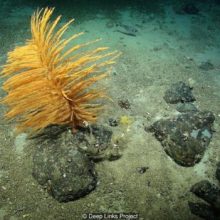Evidence submitted so far to the EPA’s hearing on a deep sea phosphate mining proposal for the Chatham Rise shows the proposal should be rejected for a number of very concerning reasons, environmental groups said today.
Chatham Rock Phosphate wants to mine phosphate off the seabed, 450m deep on the Chatham Rise, off the east coast of New Zealand’s South Island.
Greenpeace, Kiwis Against Seabed Mining and the Deep Sea Conservation Coalition have combined their representation at the meeting and today gave their submission at the hearings in Hamilton.
The activity would negatively impact both the mining area, and the site around it, destroying the benthic environment of the mined area and far beyond.
“The evidence shows that there is no realistic possibility that the area can be remediated,” lawyer Ruby Haazen, representing the three groups, told the hearing today in their summary of evidence.
“Chatham Rock’s proposal will destroy or put at risk significant biodiversity,” she said.
Lack of baseline information
Evidence that had been presented throughout the hearing showed a lack of baseline information about the creatures and corals that lived at that depth. No marine mammal survey had been carried out, and there were significant gaps in the evidence on noise, which could cause temporary or permanent threshold shift (hearing loss) in marine mammals 3 km away. The phosphates have high levels of uranium, which has raised many questions about the effects of uranium on marine species.
Questions over mining company
She also noted that Chatham Rock Phosphate had not yet even confirmed which company would undertake the mining. International mining company, Boskalis, had presented evidence for the company, but the groups had a number of concerns about the company, such as the fact that it had been involved in numerous environmental breaches – some alleged, some proven.
If Boskalis were to go ahead with the mining, this would raise a number of legal issues in the face of any environmental problems. It flew a “flag of convenience,” which are commonly used to avoid stringent regulation.
“It is completely unclear who will have responsibility if something goes wrong. The EPA may face a game of passing the buck between Chatham Rock Phosphate and Boskalis,” Haazen told the hearing.
KASM chair submission
Kiwis Against Seabed Mining Chairperson, Phil McCabe, told the hearing that the application was a “world first” in terms of seabed mining at such depth. Yet little was known about the impact, and Chatham Rock Phosphate had not done enough research. The company had cut corners and there was still not enough information to provide evidence-based understanding of the impacts.
“I am genuinely flabbergasted that they did not do a marine mammal survey. We had thought the Trans Tasman Resources’ baseline was bad, and it was, but here they didn’t even try.”
He noted that given this was a world first, there was a “unique burden of responsibility” on New Zealand to “set the bar high” on such an important decision on “an activity that promises little more than further destruction and degradation of our life supporting marine environment.”
Contact:
In Hamilton – Phil McCabe 027 294 3541
Media – Cindy Baxter – 021 772 661
Links to full submissions:
Haazen for KASM, Greenpeace, DSCC
McCabe for KASM

